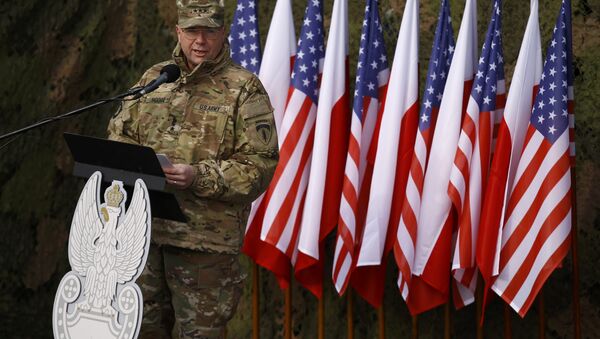UK Prime Minister Theresa May managed to secure a commitment from Donald Trump that he will fully support NATO.
During a press conference on January 27, as the UK PM was the first foreign minister to visit Trump at the White House, she was able to get the US president to stand behind the military alliance, which contradicts his views that NATO is "obsolete" which he expressed in the run-up to the US election.
As Trump's stance changed, Lieutenant General Ben Hodges, the US Army's top commander in Europe, said that he had been reassured by the president's recommitment to the military alliance.
Lieutenant General Tim Ray of US European Command, also expressed relief, saying: "The full weight of the US military stands behind these sentinels of freedom."
This comes at a time when NATO's presence, alongside US Armed Forces' tanks in the Baltic states — bordering Russia — appears to be the largest military deployment in eastern Europe since the Cold War.
The battle tanks, which participated in joint US-Polish drills in Northern Poland, will be sent to Lithuania, Latvia and Estonia, where they will be deployed until a new NATO "deterrent force" becomes operational in spring.
However not everyone views NATO positively. A survey carried out by YouGov, showed that only 46 percent of people from the US felt that NATO was still relevant, whereas a mere 16 percent of American's felt that NATO still had a vital role to play.
May might have gotten Trump to commit to NATO, but Americans less likely than Europeans to think NATO still relevant https://t.co/BFzDSRiqVI pic.twitter.com/c4CwwrQZ1n
— YouGov (@YouGov) 30 January 2017
When you compare this to European nations, where 68—80 percent of the people surveyed agreed with their own country's involvement in the organization, the difference is striking.
There is also a divide among party lines, with Republicans and independents are far less supportive of US involvement in NATO than their Democratic counterparts. 66 percent of Democrats support America's NATO membership, compared to just 37 percent of independents and 39 percent of Republicans.
We pay a disproportionate share of the cost of N.A.T.O. Why? It is time to renegotiate, and the time is now!
— Donald J. Trump (@realDonaldTrump) 24 March 2016
Prior to Trump's change apparent of heart, one of the reasons why he believed that NATO had become "obsolete" was down to the fact that it cost too much money and it wasn't "taking care of terror." This is a point that most people across the West, who were surveyed, agree on.
When asked what NATO's main focus should be, the vast majority of people surveyed said it should focus on eliminating terrorism. Only 11-22 percent of people across the continents thought that NATO's main focus should remain on mutual defense against attacks from hostile countries.
What future for NATO? Our survey looks at attitudes to the alliance in both the US and Europe https://t.co/BFzDSRiqVI
— YouGov (@YouGov) 30 January 2017
American's may not be as enthusiastic about NATO as their European counterparts, but they do feel the threat of terror. In the survey, the respondents were asked which country they felt was the biggest threat to the US, 29 percent said North Korea and 24 percent said Russia and Iran.
The future of NATO looks secure for now, with Trump's backing for the alliance being squeezed out of him by the UK PM, however the president may change his position only to make NATO "obsolete" yet again — a view that most in the US have chosen to accept.





